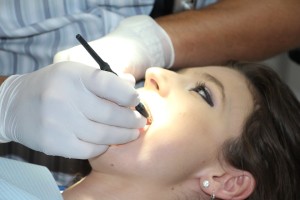 Have you ever felt sudden, unexpected pain when sipping a cold drink, brushing your teeth, or taking a bite of food? Tooth sensitivity can cause this unpleasant sensation. Sensitive teeth can force you to approach eating, drinking, and brushing with caution. You don’t have to just accept it, though – there are things that you can do to reduce tooth sensitivity and avoid these painful moments.
Have you ever felt sudden, unexpected pain when sipping a cold drink, brushing your teeth, or taking a bite of food? Tooth sensitivity can cause this unpleasant sensation. Sensitive teeth can force you to approach eating, drinking, and brushing with caution. You don’t have to just accept it, though – there are things that you can do to reduce tooth sensitivity and avoid these painful moments.
Change Your Dental Hygiene Routine
If your teeth are especially sensitive, changing up your toothbrush or toothpaste might help. Try choosing a soft-bristled brush rather than one with medium bristles, for example. Make sure that you’re not brushing too hard with your toothbrush. It’s not necessary to scrub very hard – your teeth will get just as clean with gentle brushing.
There are also toothpastes on the market made especially for people with sensitive teeth. These toothpaste varieties contain an ingredient called potassium nitrate. Potassium nitrate desensitizes the nerves that are causing your pain.
Ask for Fluoride Treatments
You may be experiencing tooth sensitivity because your tooth enamel is thin or weak, leaving the nerves underneath the enamel more exposed to elements like heat or cold that might cause pain. In that case, fluoride treatments may be the answer.
Fluoride is a naturally-occurring mineral that strengthens and hardens enamel, making teeth less vulnerable. It’s added to the water supply in most areas, as well as to many oral hygiene products. But if you drink mostly bottled water, you may not be getting enough fluoride. Ask your dentist if additional fluoride treatments can help.
Don’t Put Off Needed Dental Work
Tooth decay and tooth infections are common causes of tooth sensitivity. You may not like the idea of having your teeth drilled, but allowing cavities to grow and infections to go untreated will hurt a lot more in the long run.
Don’t avoid the dentist – get your regular checkups, and if your dentist recommends a procedure, like a filling, don’t put it off. Routine dental care can prevent a lot of pain and tooth sensitivity.
Make sure to mention your tooth sensitivity to your dentist. Your dentist will be able to help you determine the root cause of your tooth sensitivity and come up with a solution that works for you.












